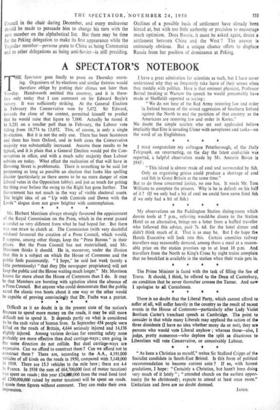Mr. Herbert Morrison always strongly favoured the appointment of the
Royal Commission on the Press, which in the event passed a 1 erdict so very different from what he had hoped for.' But there was one straw to clutch at. The Commission (with very doubtful wisdom) favoured the creation of a Press Council, which would, I suppose, among other things, keep the "Press Barons" in their places. But the Press Council has not materialised, and Mr. Morrison thinks it should. He is, moreover, under the illusion that this is a subject on which the House of Commons and the public feels passionately. "I hope," he said last week (surely a little portentously) "that they [the newspaper proprietors] will not keep the public and the House waiting much longer." Mr. Morrison knows far more about the House of Commons than I do. It may be that Members are bursting with agitation about the absence of a Press Council. But anyone who could demonstrate that the public cared the classic two hoots about it one way or the other would be capable of proving convincingly that Dr. Fuchs was a patriot. * * * *














































































 Previous page
Previous page